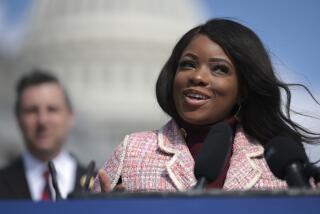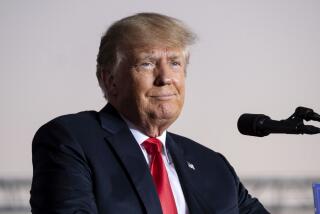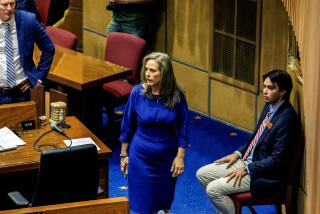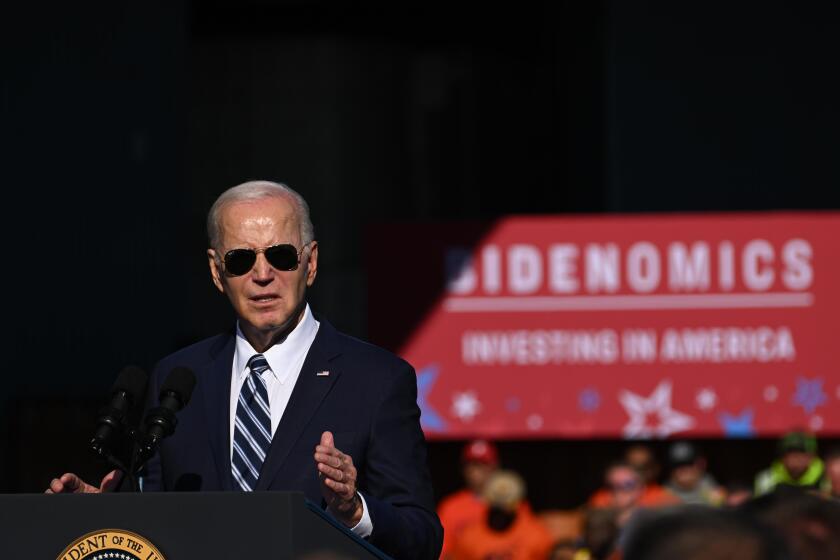Bush Goes on the Offensive Against Critics of War in Iraq
President Bush, on the defensive over allegations that he manipulated intelligence in order to build support for invading Iraq, launched an unusually sharp attack on Democratic lawmakers and other critics Friday for trying to “rewrite the history” of how and why the war began.
Bush also said his critics were undermining U.S. troops with their claims that the administration had misled the public on whether Saddam Hussein had obtained weapons of mass destruction as Iraq’s leader.
“The stakes in the global war on terror are too high, and the national interest is too important, for politicians to throw out false charges,” the president said in a Veterans Day address at the Tobyhanna Army Depot. “These baseless attacks send the wrong signal to our troops and to an enemy that is questioning America’s will.”
Bush’s aggressive rhetoric, which coincided with a similar attack on Democrats by the Republican National Committee chairman, reflected growing White House concern over signs that the public’s confidence in the president was slipping and that misgivings about Iraq were a principal cause of his problems.
The administration has already acknowledged that some prewar intelligence suggesting Hussein held or sought banned weapons was faulty. But Democrats in recent weeks have returned to the question of whether White House and other federal officials misrepresented the intelligence to the public before the war.
Saying Republicans had blocked a promised investigation into the matter, Democratic senators used a rare parliamentary maneuver this month to win assurances that the inquiry would go forward.
Public opinion surveys show that more Americans are questioning Bush’s handling of the war and of prewar intelligence. In an ABC News-Washington Post survey last week, 55% said they believed the Bush administration “intentionally misled the American public” in making its case for war.
In an AP-Ipsos poll released Friday, 57% of respondents said they would not describe Bush as honest. Bush’s approval rating in that poll remained at an all-time low of 37%.
The growing skepticism appears to have been fed by the recent indictment of I. Lewis “Scooter” Libby, who was chief of staff to Vice President Dick Cheney, in connection with the public disclosure of an undercover CIA officer’s identity.
Bush’s comments Friday suggested that Democrats, many of whom initially supported the war effort, have managed to frame the Iraq debate on their terms, forcing the president to defend past actions rather than focus on his agenda.
Bush told a crowd of soldiers and civilians at the Army depot in northeast Pennsylvania: “While it’s perfectly legitimate to criticize my decision or the conduct of the war, it is deeply irresponsible to rewrite the history of how that war began.”
The president said his critics were aware that a bipartisan investigation “found no evidence of political pressure” by the administration to push intelligence analysts to exaggerate the threat of Iraqi weapons programs. He was apparently referring to a White House commission that reported in April, after a yearlong inquiry, that U.S. intelligence had been “dead wrong” in almost all of its prewar judgments about Iraq’s illicit weapons but that the inquiry found no evidence administration officials had asked analysts to shade reports for political reasons. The panel was headed by retired federal Judge Laurence H. Silberman, a Republican, and former Virginia Gov. and Sen. Charles S. Robb, a Democrat.
Critics “also know that intelligence agencies from around the world agreed with our assessment of Saddam Hussein,” Bush said. “They know the United Nations passed more than a dozen resolutions citing his development and possession of weapons of mass destruction.”
Bush also noted that “more than a hundred Democrats in the House and the Senate -- who had access to the same intelligence -- voted to support removing Saddam Hussein from power.”
In a rare direct reference to his defeat of Sen. John F. Kerry (D-Mass.) in the 2004 presidential campaign, Bush said that many of his critics had “supported my opponent during the last election” and that Kerry had himself cited Iraqi weapons programs when he voted to support the use of force in Iraq.
In coordinated remarks to a GOP dinner in Indiana, Republican National Committee Chairman Ken Mehlman said many Democrats who had agreed with Bush on the prewar intelligence wanted an investigation. “Maybe this investigation will reveal that they were brainwashed,” he said.
Echoing another of Bush’s points, Mehlman said the Democrats’ “political doublespeak sends exactly the wrong message to our troops, to the Iraqis and to our terrorist enemies.”
Democrats in Congress continued to press their criticisms of the president, setting off a daylong series of rhetorical volleys between the White House and its critics. Democratic lawmakers accused the president of twisting the facts and called for a new administration strategy for withdrawing U.S. troops from Iraq.
Sen. Edward M. Kennedy (D-Mass.) accused the president of using Veterans Day “as a campaign-like attempt to rebuild his own credibility by tearing down those who seek the truth about the clear manipulation of intelligence in the run-up to the Iraq war. Instead of providing open and honest answers about how we will achieve success in Iraq and allow our troops to begin to come home, the president reverted to the same manipulation of facts to justify a war we never should have fought.”
He said Bush’s speech “only further tarnished this White House and further damaged his presidency.”
In an unusual rebuttal, White House Press Secretary Scott McClellan later e-mailed to news reporters a reminder that Kennedy had expressed concern about Hussein and weapons of mass destruction and yet had voted on two occasions against the use of force against the Iraqi autocrat, once before the Persian Gulf War in 1991 and again before the 2003 invasion.
“It is ... regrettable that Sen. Kennedy has found more time to say negative things about President Bush than he ever did about Saddam Hussein,” McClellan said in his written comments.
It is uncommon for the White House to rebuke an individual lawmaker, and the move reflected the heightened sensitivity to criticism of the war effort.
The president’s 50-minute speech also lashed out at the government of Syria, which the administration accuses of meddling in Lebanon, permitting insurgents to flow across its border into Iraq and supporting Palestinian and Lebanese militants.
The administration has strongly promoted a United Nations resolution urging Syria to cooperate in the U.N.-sponsored investigation of the assassination of former Lebanese Prime Minister Rafik Hariri.
“The government of Syria must do what the international community has demanded: cooperate fully with the [U.N.] investigation and stop trying to intimidate and destabilize the Lebanese government,” Bush said. “The government of Syria must stop exporting violence and start importing democracy.”
Although it is customary for Republican members of a state’s congressional delegation to attend Bush appearances in their state, Sen. Rick Santorum (R-Pa.) was not on hand at the president’s Veterans Day rally. Santorum’s office said he had a conflicting speaking engagement in Philadelphia.
As Bush was speaking in Pennsylvania, Cheney took the president’s place at the traditional Veterans Day ceremony at Arlington National Cemetery in Virginia, where he laid a memorial wreath at the Tomb of the Unknowns.
Cheney expressed gratitude to the 25 million Americans who had served in the armed forces since the Republic was founded.
“Thanks to our veterans, the people of this great nation have lived in freedom for 229 years,” Cheney said. “We owe them our liberty.”
Vieth reported from Pennsylvania and Gerstenzang from Washington. Times staff writers Paul Richter, Doyle McManus and Richard Simon contributed to this report.
More to Read
Get the L.A. Times Politics newsletter
Deeply reported insights into legislation, politics and policy from Sacramento, Washington and beyond. In your inbox three times per week.
You may occasionally receive promotional content from the Los Angeles Times.






